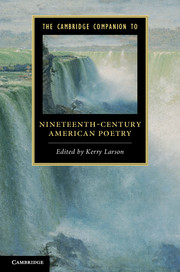Book contents
- Frontmatter
- Introduction
- I MANDATES, MOVEMENTS, AND MANIFESTOES
- 1 The reception of nineteenth-century American poetry
- 2 American Indian poetry in the nineteenth century
- 3 The poet as Poetess
- 4 Transcendentalist poetics
- 5 Slavery and its metrics
- 6 Weathering the news in US Civil War poetry
- 7 The “Twilight of the Poets” in the era of American realism, 1875–1900
- II INDIVIDUAL AUTHORS
- Selected guide to further reading
- Index
- Cambridge Companions to…
3 - The poet as Poetess
from I - MANDATES, MOVEMENTS, AND MANIFESTOES
Published online by Cambridge University Press: 28 November 2011
- Frontmatter
- Introduction
- I MANDATES, MOVEMENTS, AND MANIFESTOES
- 1 The reception of nineteenth-century American poetry
- 2 American Indian poetry in the nineteenth century
- 3 The poet as Poetess
- 4 Transcendentalist poetics
- 5 Slavery and its metrics
- 6 Weathering the news in US Civil War poetry
- 7 The “Twilight of the Poets” in the era of American realism, 1875–1900
- II INDIVIDUAL AUTHORS
- Selected guide to further reading
- Index
- Cambridge Companions to…
Summary
The Poetess is one of those nineteenth-century social facts that make twentieth- and twenty-first-century literary historians uncomfortable. Like the horsehair sofa, the Poetess seems to us now a somewhat embarrassing commonplace of nineteenth-century culture we do well to live without. Eve Sedgwick's observation on the fortunes of “sentimentality” goes double for the Poetess:
The strange career of “sentimentality,” from the later eighteenth century when it was a term of high ethical and aesthetic praise, to the twentieth when it can be used to connote, beyond pathetic weakness, an actual principle of evil … is a career that displays few easily articulable consistencies, and those are not … consistencies of subject matter. Rather, they seem to inhere in the nature of the investment of a viewer in a subject matter
Like “sentimentality,” the Poetess is difficult to define except as an occasion for shifting historical definitions of women and of poetry. Yet notions of the nineteenth-century Poetess have not only depended on changing understandings of gender or verse or poetics (histories to which we will return), but have consistently converged on a hermeneutics of suspicion. Is the Poetess just a fancy name for the woman poet? If so, then why not “drop the feminine termination,” as the poet Elizabeth Oakes Smith suggested in the mid nineteenth century? Perhaps it has proven difficult to follow Oakes Smith's sensible suggestion because what is at stake in the idea of the Poetess is overdetermined, in excess of subject or subject matter. The Poetess neither is nor was simply a poet. What you think a Poetess is may depend entirely on your investment in the idea – and certainly depended on very different nineteenth-century investments in the idea. Such a relativist definition of the Poetess as a hologram of readerly desire may fit twenty-first-century postmodern or poststructuralist tastes better than did the lace-collared portrait of the woman poet over the horsehair sofa, but the most interesting thing about the strange career of the Poetess since the eighteenth century is that the figure seems to have had this apparently modern indexical function all along.
- Type
- Chapter
- Information
- Publisher: Cambridge University PressPrint publication year: 2011
- 4
- Cited by



